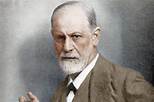DREAM DICTIONARY
Made Of Dreams
Search
Dream Psychology - Sigmund Freud - Introduction - 2








Dream Psychology - Sigmund Freud - Introduction - 2
Other explorers have struck the path blazed by Freud and leading into man's unconscious. Jung of Zurich, Adler of Vienna and Kempf of Washington, D.C., have made to the study of the unconscious, contributions which have brought that study into fields which Freud himself never dreamt of invading.
One fact which cannot be too emphatically stated, however. is that but for Freud's wish fulfillment theory of dreams, neither Jung's "energic theory" nor Adler's theory of "organ inferiority and compensation," nor Kempfs " dynamic mechanism" might have been formulated.
Freud is the father of modern abnormal psychology and he established the psychoanalytical point of view. No one who is not well grounded in Freudian lore can hope to achieve an work of value in the field of psychoanalysis. On the other hand, let no one repeat the absurd assertion that Freudism is a sort of religion bounded with dogmas and requiring an act of faith. Freudism as such was merely a stage in the development of psychoanalysis, a stage out of which all but a few bigoted camp followers, totally lacking in originality, have evolved.
Thousands of stones have been added to the structure erected by the Viennese physician and many more will be added in the course of time. But the new additions to that structure would collapse like a house of cards but for the original foundations which are as indestructible as Harvey's statement as to the circulation of blood. Regardless of whatever additions or changes have been made to the original structure, the analytic point of view remains unchanged.
That point of view is nt only revolutionising all the methods of diagnosis and treatment of mental derangements , but compelling the intelligent , up-to-date physician to revise entirely his attitude to almost every kind of disease. The insane are no longer absurd and pitiable people, to be herded in asylums till nature either cures them or relieves them, through death, of their misery.
The insane who have not been made so by actual injury to their brain or nervous system, are the victims of unconscious forces which cause them to do abnormal things which they might be helped to do normally.
Insight into one's psychology is replacing victoriously sedatives and rest cures. Physicians dealing with "purely" physical cases have begun to take into serious considerations the "mental" factors which have predisposed a patient to certain ailments. Freud's views have also made revision of all ethical and social values unavoidable and have thrown an unexpected flood of light upon literary and artistic accomplishment.
But the Freudian point of view, or more broadly speaking, the psychoanalytic point of view, shall ever remain a puzzle, to those who, from laziness or indifference, refuse to survey with the great Viennese the field over which he carefully groped his way. We shall never be convinced until we re[eat under his guidance all his laboratory experiments.
We must follow him through the thickets of the unconscious, through the land which has never been chartered because academic philosophers, following the line of least effort, had decided a priori that it could not be charted.
Ancient geographers, when exhausting their store of information about distant lands, yielded to an unscientific craving for romance and, without any evidence to support their day dreams, filled the blank spaces left on their maps by unexplored tracts with amusing inserts such as "Here there are lions".
Thanks to Freud's interpretation of dreams the "royal road" into the unconscious is now open to all explorers .
They shall not find lions, they shall find man himself, and the record of all his life and of his struggle with reality. And it is only after seeing man as his unconscious, revealed by his dreams, presents him to us that we shall understand him fully.
For as Freud said to Putman: " We are what we are because we have been what we have been." Not a few serious-minded students however, have been discouraged from attempting a study of Freud's dream psychology.
The book in which he originally offered to the world his interpretation of dreams was as circumstantial as a legal record to be pondered over by scientists at their leisure, not to be simulated in a few hours by the average alert reader. In those days. Freud could not leave out an detail likely to make his extremely novel thesis evidentially acceptable to those willing to sift data.
Freud, himself however, realized the magnitude of the task which the reading of his magnum opus imposed upon those who have not been prepared for it by long psychological and scientific training and he abstracted from that gigantic work the parts which constitute the essential of his discoveries. The publishers of the present book deserve credit for presenting to the reading public the gist of Freud's psychology in the master's own words, and in a form which shall neither discourage beginners, nor appear too elementary to those who are more advanced in psychoanalytic study.
Dream psychology is the key to Freud's works and to all modern psychology. With a simple, compact manual such as Dream psychology there shall be no longer any excuse for ignorance of the most revolutionary psychological system of modern times.
Reference: Dream Psychology : Sigmund Freud.


